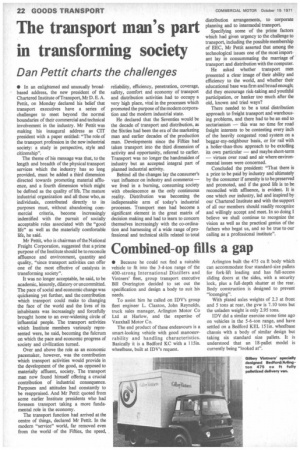The transport man's part in transforming society
Page 24

If you've noticed an error in this article please click here to report it so we can fix it.
Dan Pettit charts the challenges
• In an enlightened and unusually broadbased address, the new president of the Chartered Institute of Transport, Mr D. E. A. Pettit, on Monday declared his belief that transport executives have a series of challenges to meet beyond the normal boundaries of their commercial and technical involvement in the industry. Mr Pettit was making his inaugural address as CIT president with a paper entitled: "The role of the transport profession in the new industrial society: a study in perspective, style and citizenship".
The theme of his message was that, to the length and breadth of the physical transport services which the industry has so long provided, must be added a third dimension directed towards promoting material affluence, and a fourth dimension which might be defined as the quality of life. The mature industrial organization and all those who, as individuals, contributed directly to its purposes must, without abandoning commercial criteria, become increasingly indentified with the pursuit of socially acceptable roles associated with the "good life" as well as the materially comfortable life, he said.
Mr Pettit, who is chairman of the National Freight Corporation, suggested that a prime purpose of the Institute should be to reconcile affluence and environment, quantity and quality, "since transport activities can offer one of the most effective of catalysts in transforming society".
It was no longer acceptable, he said, to be academic, leisurely, dilatory or uncommitted. The pace of social and economic change was quickening yet further, and the contribution which transport could make to changing the face of the world and the lives of its inhabitants was increasingly and forcefully brought home to an ever-widening circle of influential people. The transport activities which Institute members variously represented were, he said, becoming the fulcrum on which the pace and economic progress of society and civilization turned.
Over and above the role as an economic pacemaker, however, was the contribution which transport activities would provide in the development of the good, as opposed to materially affluent, society. The transport man now found himself offering a crucial contribution of industrial consequence. Purposes and attitudes had constantly to be reappraised. And Mr Pettit quoted from some earlier Institute presidents who had foreseen transport taking a more fundamental role in the economy.
The transport function had arrived at the centre of things, declared Mr Pettit. In the modern "service" world, far removed even from the world of the Fifties, the speed, reliability, efficiency, penetration, coverage, safety, comfort and economy of transport and distribution activities had to occupy a very high place, vital in the processes which promoted the purpose of the modern corporation and the modern industrial state.
He declared that the Seventies would be the decade of transport and distribution, as the Sixties had been the era of the marketing man and earlier decades of the production man. Developments since the Fifties had taken transport into the third dimension of activity and opportunity, referred to earlier. Transport was no longer the handmaiden of industry but an accepted integral part of planned industrial activity.
Behind all the changes lay the consumer's vast influence on industry and commerce— we lived in a burning, consuming society with obsolescence as the only continuous reality. Distribution was becoming the indispensable arm of today's industrial processes. Transport men had become a significant element in the great matrix of decision making and had to learn to concern themselves increasingly with the co-ordination and harnessing of a wide range of professional and technical skills related to total
distribution arrangements, to corporate planning and to intermodal transport.
Specifying some of the prime factors which had given urgency to the challenge to transport, including the possible membership of EEC, Mr Pettit asserted that among the technological issues one of the most important lay in consummating the marriage of transport and distribution with the computer.
He asked whether transport men presented a clear image of their ability and efficiency to the world, and whether their educational base was firm and broad enough; did they encourage risk-taking and youthful participation, or hanker too much after the old, known and tried ways?
There needed to be a total distribution approach to freight transport and warehousing problems, and there had to be an end to sectarianism — this was no time for road freight interests to be contesting every inch of the heavily congested road system on a beggar-my-neighbour basis, or for rail with a holier-than-thou approach to be extolling its own particular — and maybe short-term — virtues over road and air where environmental issues were concerned.
Concluded the president: "That there is a price to be paid by industry and ultimately by the consumer if amenity is to be preserved and promoted, and if the good life is to be reconciled with affluence, is evident. It is one which our industry, led and inspired by our Chartered Institute and with the support of all our members should readily recognize and willingly accept and meet. In so doing I believe we shall continue to recognize the vision as well as the practical genius of the fathers who begat us, and so be true to our calling as a professional institute".
















































































































